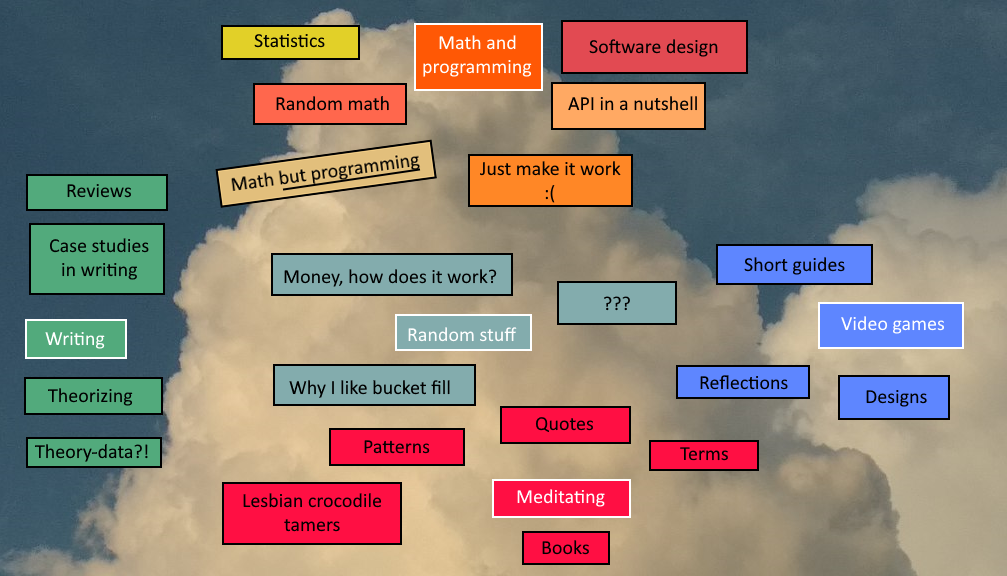Map and guide
This is an overview of the blog and selected posts from it. This is a notebook blog. That means two things. First, I write about whatever comes to mind. Second, I don't strain to make it useful to anyone else. I think much of it happens to be useful or interesting anyway, but that's for you to decide. Often I write to figure things out. Sometimes I go deep.
I write about a variety of things. I write close readings and writing thoughts about fiction, programming thoughts, math problems and proofs, reflections on meditation, and notes about video games, but also money (how does it ground out in real activity?) and statistics (also how does it ground?).
I've selected a few posts from each of these broad categories to show the feel.
Unless otherwise noted, assume any given post has been written "from the hip," with minimal research not linked. (That is probably a good rule for reading in general, outside maybe textbooks.) Reader beware.

I write fiction, and care a lot about writing it well. I have written many case studies of specific passages and stories in terms of devices and structure. Most but not all of these are of Discworld books, which make for excellent examples. I've also written reviews of a few short stories and the book Norse Mythology. I've collected data for writing theory about scene lengths in short stories. I've written about theory, like how surprising yourself can be a good way to find the interesting part of your story — as can finding the tension or viewing stories as spacious. I've also written about editing one of my stories. Really there's a lot of writing about fiction and fiction-writing.
I program, and like to do that well also. Sometimes I write technical quick guides or notes about things I've done. I've written about the OpenFHE library's API for fully homomorphic encryption, abstract and concrete lifetimes in Rust, loading big models into memory for sharding using meta tensors, calculating sample sizes and a design for a group sequential experiment design, saving Excel files from Python in a bit-for-bit reproducible way, and a quick reference for Python's Tkinter library. Sometimes I write write about vaguer issues and questions, like the (de)serialization problem of writing batch processing pipelines. Sometimes I write posts that ride the line between math and programming, for example about the size of language-space, unicode surrogates and exponential growth, why floating point numbers don't form a ring, and subnormal floating point numbers. Of course there's more where that came from.
Sometimes I do math for fun and sometimes for other reasons. I sometimes write toward proofs. In a textbook proofs are more like speedruns of the logic behind a proposition. The proofs I've written up are more like illustrations of a "first playthrough" of the problem. I get sidetracked on dead-end leads and content that goes nowhere. That's what makes it interesting — it's a partial showcase of what doing math can look like, rather than a product in itself. (Conveniently, it also makes it more of a pain for anyone trying to cheat on their homework. You wouldn't be doing that, would you? 🙂) For example, I wrote an illustrated proof that unit complex numbers adding to zero must form a complex rectangle. Sometimes I write about general ideas, like how approximation goes both ways. I've also written about more practical questions of metrics, like measuring density of connections in a followership. I also made a LaTeX meme and regret nothing. And there are others.
Sometimes I think about how statistics works. I think that "true" or population parameters don't exist. That's because "populations" are nebulous. I suspect statistical independence is also kind of fake. I have questions about how statistics works; is the number of letters in a post a random variable? I suspect random variables ground to abstract outcomes of concrete processes. And I've wondered about the difference between fixed-effects and random-effects models. There may be others.
I meditate. I've meditated since April of 2022. In reaction to this, I have written lots of posts about patterns that I find myself going through. Like: A feeling that doing something badly is inherently bad, and the search for tricks . Sometimes this helps change the patterns. Sometimes it doesn't. Meditation can be brutally boring, as I've rediscovered a few times. It inspires ambivalence. I seem to want to think and write about it, so I've also reviewed quotes, terminology, and books like The Myth of Freedom. And I've thought about "view" questions, like what does it mean to say that there are no spiritual problems? Lots more posts here.
(Also: Did you know there was a lesbian crocodile tamer mahasiddha/drüpchen?)
I play video games. Sometimes they have a good story and I write about that, for example with OMORI and Yuppie Psycho: Its witch paper, its recurring themes and its endings. Sometimes I reflect on their design, like how modded cards change value in 1v1 vs. in 4-player free-for-all, how Brogue works without having a skill system, or Octopath Traveler's "breaking" mechanic. Sometimes I write reflections, guides or tips, like this series on Dyson Sphere Program, my hint guide to understanding and reading Tunic's script or a short guide to using Valheim's raft. There's more.
But I also write about whatever comes up as interesting. Sometimes it's vaguely money-related: How does money work? Why would we care about lowering costs of transactions or using a technology? What's capital? Sometimes it's wrestling with an idea and wondering whether it makes sense. Sometimes it's why I picked my username (one of them, anyway!). Sometimes it's just why I like bucket fill.
Enjoy your visit.